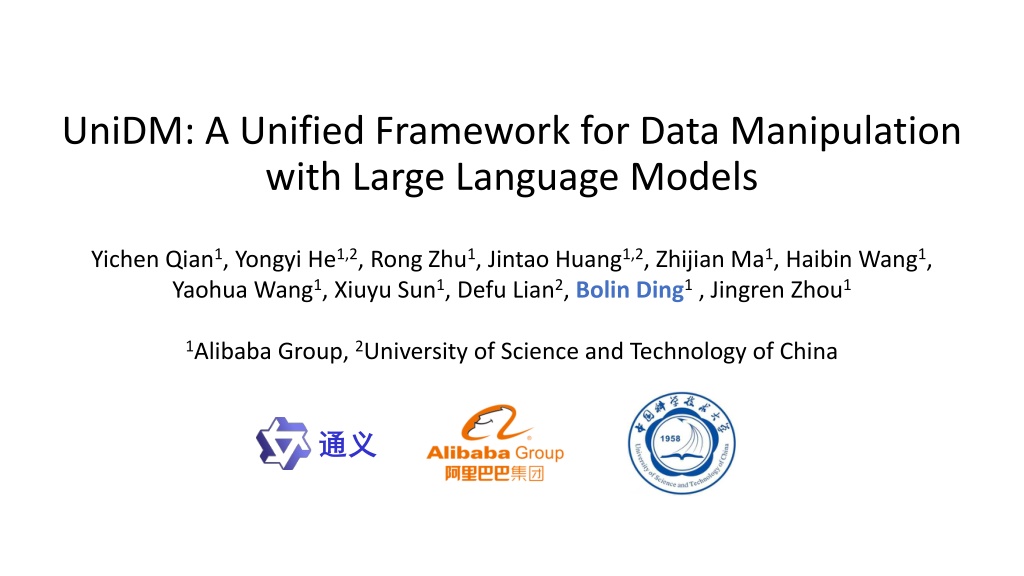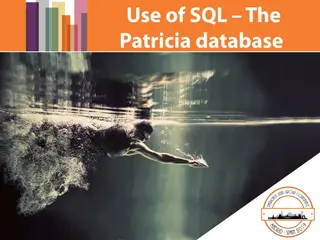
Unified Framework for Data Manipulation with Large Language Models
Explore UniDM, a unified framework for data manipulation with large language models, tackling tasks such as data imputation, transformation, error detection, and more. Learn about Pre-LLM attempts, the role of LLMs as knowledge bases, and the advancements in LLM technology for data wrangling post-2022.
Download Presentation

Please find below an Image/Link to download the presentation.
The content on the website is provided AS IS for your information and personal use only. It may not be sold, licensed, or shared on other websites without obtaining consent from the author. Download presentation by click this link. If you encounter any issues during the download, it is possible that the publisher has removed the file from their server.
E N D
Presentation Transcript
UniDM: A Unified Framework for Data Manipulation with Large Language Models Yichen Qian1, Yongyi He1,2, Rong Zhu1, Jintao Huang1,2, Zhijian Ma1, Haibin Wang1, Yaohua Wang1, Xiuyu Sun1, Defu Lian2, Bolin Ding1, Jingren Zhou1 1Alibaba Group, 2University of Science and Technology of China
Data Manipulation Tasks (for Relational Data) Building a data processing tool for a class of data manipulation tasks Task Input attributes ? Input records ? Output ? one attribute ? with missing value one record (row) ? in the table Data Imputation the missing value ?[?] one attribute ? whose value to be transformed to new format one record (row) ? in the table the new value ? [?] transformed from the original value ?[?] Data Transformation one attribute ? whose value may be incorrect one record (row) ? in the table binary answer on whether the value ?[?] is correct Error Detection a number of attributes ? related to the entity description task binary answer on whether the records ?1,?2refer to the same entity or not a pair of records ?1,?2in the tables Entity Resolution Join Discovery, Table QA, ... More details in the paper, Applications: data cleaning/augmentation, data analytics, enrich training data, Example: Data Imputation city country timezone Central European Time ? population postalcode Alicante Spain 337482 3000 Copenhagen Denmark 809314 1050 ...
Pre-LLM Attempt: Probase (2010-) Massive data => large knowledgebase https://www.microsoft.com/en-us/research/project/probase/ [Song et al. IJCAI2011] [Wu et al. SIGMOD2012] Generate taxonomy: InstanceOf , AttributeOf , Massive data => large language model Should LLM be more capable?
Why LLM? city country timezone Central European Time ? population postalcode Example: Data Imputation Alicante Spain 337482 3000 Copenhagen Denmark 809314 1050 ... LLM as a knowledgebase (browsing the knowledgebase via prompting) Context may help (considering surrounding records as examples in the prompt) Next-token-prediction => data imputation as a cloze question E.g., Copenhagen s timezone is ____ Ability of parsing/formating data: with instruction and/or examples unstructured data relational data code generation https://platform.openai.com/examples/default-spreadsheet-gen
After-LLM Attempts (2022-now) Can LLMs wrangle your data? [Narayan et al. VLDB2022] city country timezone Central European Time ? population postalcode Alicante Spain 337482 3000 Copenhagen Denmark 809314 1050 ... Prompt Task description Filling missing data Demonstration city: Alicante, country: Span, timezone? CET Task input City: Copenhagen, country: Denmark, timezone? Other related work Can LLMs predict data correlations from column names? [Trummer VLDB2022] Table fine-tuned GPT for diverse table tasks [Li et al. SIGMOD2024]
Challenges and Our Contributions How to write the prompt automatically (we are building a data tool not a chatbot)? How to retrieve context or construct demonstration automatically from data? How to construct LLM-friendly prompt from relational data (tables)? Can LLM itself help us solve the above challenges? Need of a unified framework for a large class of data manipulation tasks
Our UniDM Framework Data Manipulation Tasks Data flow Parameters pass Data Lake Data Pre-process Use LLM Task parameters Natural text Our Parse Retrieve Prompt T T + UniDM Framework Context Data Parsing Automatic Context Retrieval Target Result Prompt Construction Large Language Model Automatic Context Retrieval: identify useful context information while filtering irrelevant data to facilitate the LLMs Context Data Parsing: transform the context information into a more LLM-friendly format as part of the prompt Target Prompt Construction: with the retrieved context, the task description, and task inputs, construct the final prompt (using LLMs)
Our UniDM Framework Data Manipulation Tasks Data flow Parameters pass Data Lake Data Pre-process Use LLM Task parameters Natural text Our Parse Retrieve Prompt T T + UniDM Framework Context Data Parsing Automatic Context Retrieval Target Result Prompt Construction Large Language Model Input: task, records, attributes Prompt: context_r, context_a Automatic_Context_Retrieval(task, records, attributes) context Context_Data_Parsing(context_r, context_a) cloze_question Target_Prompt_Construction(task, context) final_prompt context + cloze_question
UniDM: Automatic Context Retrieval Automatic Context Retrieval Task Parameters Data Imputation: Copenhagen, timezone Identify useful information while filtering irrelevant data to facilitate the LLMs metadata instances Alicante, Florence, country, population, Prompt ??? Prompt ??? Metadata-wise retrieval: find relevant attributes from the whole table Metadata-wise Retrieval Instance-wise Retrieval LLM Iterate LLM Instance-wise retrieval: extract useful records as examples ?? ?? Select attributes Select top-k instances ? Prompt ???: The task is [data imputation]. The target query is [timezone]. The attributes about [city] are [country, population, postalcode]. Which attributes are helpful for the task and the query? (Output) country Prompt ???: The task is [data imputation]. The target query is [Copenhagen]. Score the relevance (range from 0 to 3) of the given instances based on the task and the query: [Alicante, Florence, Athens, Helsinki, Antwerp, London] (Output) Alicante:3,Florence:2,Athens:1,
UniDM: Automatic Context Retrieval Automatic Context Retrieval Task Parameters Data Imputation: Copenhagen, timezone Identify useful information while filtering irrelevant data to facilitate the LLMs metadata instances Alicante, Florence, country, population, Prompt ??? Prompt ??? Metadata-wise retrieval: find relevant attributes from the whole table Metadata-wise Retrieval Instance-wise Retrieval LLM Iterate LLM Instance-wise retrieval: extract useful records as examples ?? ?? Select attributes Select top-k instances ? Prompt ???: The task is [data imputation]. The target query is [timezone]. The attributes about [city] are [country, population, postalcode]. Which attributes are helpful for the task and the query? (Output) country Prompt ???: The task is [data imputation]. The target query is [Copenhagen]. Score the relevance (range from 0 to 3) of the given instances based on the task and the query: [Alicante, Florence, Athens, Helsinki, Antwerp, London] (Output) Alicante:3,Florence:2,Athens:1,
UniDM: Context Data Parsing Context Data Parsing ?: context data city country timezone Transform the context information into a more LLM-friendly format (closer to training data) Alicante Spain Central European Time Florence Italy Central European Time Antwerp Belgium Central European Time Serialize relational tuples into text using LLMs Serialize function Data Parsing ? LLM Prompt ??? ? Prompt ???: Given the data, convert the items into a textual format that encompasses all relevant information in a logical order: serialized data [city: Florence, country: Italy, timezone: Central European Time city: Alicante, country: Spain, timezone: Central European Time city: Antwerp, country: Belgium, timezone: Central European Time] (Output) Florence is a city of Italy and in the timezoneCentral European Time...
UniDM: Target Prompt Construction Target Prompt Construction Data after parsing Task Parameters With the retrieved context, the task description, and task inputs (claim), construct the final prompt as a cloze question, using LLM itself ? Data Imputation: Copenhagen, timezone Prompt ??? Prompt ??? Cloze question Next-token prediction Prompt Engineering LLM LLM Give examples for different tasks Central European Time Prompt ???: Write the claim as a cloze question. Claim: The task is [data discovery]. The context is [A city is a human settlement smartcity ] The target query is [smart city?]. Cloze question: The task is to discover data from the context. A city is a human settlement A smart city is __. Claim: The task is [data imputation]. The context is [Florence is a city of Italy and in the timezone Central European Time ]. The target query is [city: Copenhagen, country:Denmark, timezone:?]. Cloze question: demonstration (Output Prompt ???) The task is to impute the missing value The context is Copenhagen is a city of Denmark and in the timezone __.
Experiment: SOTA Methods For all of them LLM-based: FM (Narayan et al., 2022) and UniDM (ours), on GPT-3 Error Detection HoloClean (Rekatsinas et al., 2017) HoloDetect (Heidari et al., 2019) Data Imputation Statistics-based: HoloClean (Rekatsinas et al., 2017; Wu et al., 2020) Clustering: CMI (Zhang et al., 2008) LLM-based: IPM (Mei et al., 2021) Entity Resolution Magellan (Konda et al., 2016) Ditto (Li et al., 2020) More: refer to our TR Data Transformation Search-based: TDE (He et al., 2018) https://arxiv.org/pdf/2405.06510
Experiment: Performance Evaluation Accuracy on data imputation with SOTA Accuracy on data transformation with SOTA Data Imputation Accuracy (%) Data Transformation Accuracy (%) Method Restaurant Buy Method Bing- StackOverflow HoloClean CMI IPM FM (random) FM (manual) 33.1 56.0 77.2 81.4 88.4 16.2 65.3 96.5 86.2 98.5 92.3 QueryLogs 32.0 54.0 56.0 TDE 63.0 65.3 67.4 FM (manual) UniDM Format transformation for ip, physical address, phone, etc UniDM (random) 87.2 UniDM 93.0 98.5 Restaurant: city? Buy: manufacturer?
Experiment: Performance Evaluation F1-score on error detection with SOTA F1-score on entity resolution with SOTA Entity Resolution F1-Score (%) iTunes- Amazon 78.8 91.2 94.4 97.1 92.3 96.3 100 98.2 96.3 96.3 Error Detection F1-Score (%) Hospital 51.4 94.4 97.1 99.8 Method Method Amazon- Google 49.1 75.6 60.7 63.5 64.3 Walmart- Amazon 71.9 86.8 73.8 87.0 88.2 Adult 54.5 99.1 99.1 99.7 Beer HoloClean HoloDetect FM UniDM Magellan Ditto FM (random) FM (manual) UniDM Error rate: 5% Ground truth is available for eval A relational tuple is an entity Entity pairs from two tables Ground truth is available
Experiment: Ablation Study Every step contributes to UniDM Data Imputation Acc (%) Instance-wise Retrieval Metadata-wise Retrieval Target Prompt Construction Context Data Parsing Restaurant 82.6 Buy 90.8 84.9 92.3 90.7 90.8 90.7 92.3 91.9 96.9 93.0 98.5 Data Transformation Acc (%) Target Prompt Construction Context Data Parsing Stack Overflow 63.3 Bing- QueryLogs 52.0 65.3 52.0 65.3 54.0 67.4 56.0
Experiment: Different Base Models Larger models are better, while smaller models are also fine Data Imputation Acc (%) Restaurant 93.0 96.5 89.5 86.0 88.4 86.0 Model Buy 98.5 98.5 96.9 95.4 96.9 93.8 GPT-3-175B GPT-4-Turbo Claude2 LLaMA2-7B LLaMA2-70B Qwen-7B
Experiment: Finetuning Finetuning with domain knowledge (i.e., training dataset in benchmark) helps a lot Entity Resolution F1-Score (%) UniDM on Walmart- Amazon 18.4 86.6 40.6 89.4 88.2 LLM GPT-J-6B GPT-J-6B (finetune) LLaMA2-7B LLaMA2-7B (fine-tune) GPT-3-175B
Conclusions & Future Works Identifying tasks LLMs are truly capable of A unified and automatical framework for a class of data manipulation tasks Invoking LLM multiple times: teaching LLMs in the same way of teaching kids Automatic Context Retrieval (finding examples) -> Context Data Parsing (understanding the examples) -> Target Prompt Construction (asking the right question) Improving efficiency, fine-tuning, RAG, Text-to-SQL (Gao et al., VLDB2024) + data manipulation (this work) + feature augmentation (Lin et al., CIDR2024) => a copilot for data scientists? (building)
UniDM: A Unified Framework for Data Manipulation with Large Language Models Q & A Bolin Ding bolin.ding@alibaba-inc.com






















